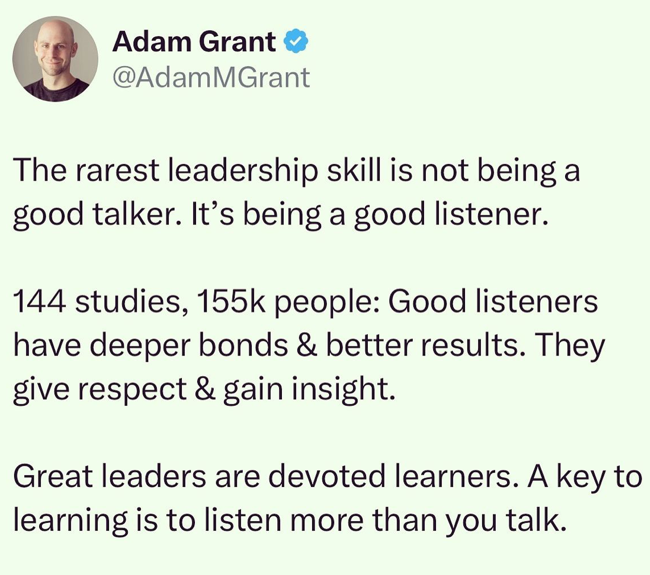Humility in Leadership

There's an individual in the broad sphere of my work life that I only interact with a few times a year. Invariably at some point the individual will tell a story, and within that story say something to the effect of "I didn't want any recognition, but.." and then proceed to describe how they received recognition. It always leaves me a bit puzzled because telling the story on its own is another way to invite the same recognition they claim not to want, sort of the way it doesn't make a lot of sense when someone talks about how humble they are. We've all been there, trying to be good conversationalists but feeling put off by the self-spotlighting.
When I reflect about what's going on here and why I feel something between disdain and dislike about these moments, I think it comes down to something in the vicinity of humility. Everything is researched, so I dug into what researchers have to say about humility.
To being with, what is humility, and what isn't humility?
While different researchers use different terminology, their definitions have concepts in common:
- acknowledgement of one’s limits and imperfections
- openness to new ideas
- joy at the success of others
- extending credit to others
- minimizing the recognition we seek for ourselves
I think it’s the last part that I tend to associate most closely with “humility,"
I don’t say this with any sort of moral high ground. It seems like there's a mild base level of non-humility we all carry as a way to exist on this planet as creatures who need social interaction, and probably some extrinsic recognition now and then to validate our directions and choices in life. I don't think the question to ask ourselves is whether we are a humble or non-humble person. That's a little too absolutist or simplified of a frame to sound realistic to me. It's not an either/or, but probably a continuum of humility. As I see it, the question to ask myself is to what extent is humility guiding life and what is the affect of it on others? In the example I opened with, the lack of humility is off-putting. But what if someone was so humble they didn't share an accomplishment even with their family or close friends? That seems a little flawed as well.
There are some helpful distinctions in the research on this: we can share to inform, which is different than sharing to seek recognition or more bluntly, to gloat. The words we use and the tone we take would be different if we're informing versus inviting recognition. So it’s not necessarily what we say that determines humility (though it seems like it could be), it’s how we present it, and the how part can be tied to our motives for sharing something to begin with.
There are some interesting ironies in research studies about humility in organizational leadership. Humility is one of the strongest predictors of others' satisfaction with their leader, and the leader’s commitment to inclusion when making decisions. People like humble leaders, and humble leaders tend to extend opportunities to others to weigh in on decisions. That makes a lot of intuitive sense to me. Then, given that people like humility in their leaders, and humility tends to create collaborative environments, research also shows that humility is strongly associated with creativity and innovation, and better team and organizational performance. That also makes a lot of intuitive sense to me.
But, ironically, some of the strongest perceptions about humility in leadership positions are that it prevents upward movement in an organization for the humble leader, and we think humility is perceived by others as a weakness. Neither of those are actually true. Humble leaders still get promoted, and today, humility and lifting others up via empowerment is considered a leadership asset. We just think it’s a weakness because we tend to juxtapose it against the traditional assertive and decisive personality that we have historically associated with what it takes for someone to claw their way to the top.
It’s a peculiar coexistence of behaviors and beliefs. We perform better and we’re more satisfied with leaders who we see as humble, but we think others will see those same qualities as a weakness. We are strange creatures with our thoughts and beliefs sometimes.
In the graduate program in conservation leadership I used to lead, I often used some version of "you can rarely go wrong with humility". Now I understand why it's generally a winning strategy: more satisfied team members, greater opportunities for others to influence decisions, stronger creativity and innovation...those are desirable outcomes!
Adam Grant, PhD studies management at the Wharton School, a business school at University of Pennsylvania. He uses a term confident humility to describe his recommended approach, an approach based on 120+ articles in a 20 year (to date) career, which is an impressive pace of published research in the world of academia. For context, 50 articles in 20 years would be considered decent at most universities for professors with research expectations. Confident humility isn't the ironic phrase it might initially seem to be; Dr. Grant's research indicate the two characteristics work in tandem: confidence to know and utilize your strengths/assets, and humility to acknowledge and admit your shortcomings without fear. Without humility, we risk over-estimating our strengths, and without confidence, we risk acknowledging and hiding our weaknesses. The result of confident humility is believing in yourself while remaining open to new approaches and information. It's a simple formula to understand, but like so much human behavior, can be difficult to implement and make a habit. But I like the tightly packaged phraseology of confident humility; it's a quippy target to shoot for.
Some tangible tips from research for how to practice humility in leadership positions:
- be aware of your limits and do the hard work of building self-awareness
- seek feedback regularly from peers and colleagues
- share you limits with others and let them know where you need their skills; treat your limits as normal, not something to conceal
- listen more, talk less. Humble leaders are focused on others, and thus listening is a more valuable strategy
- acknowledge and celebrate the achievements of others. Actively recognize when a team has demonstrated successful learning and performance
- keep yourself in check regarding your own need or pursuit for recognition. It might need to be restrained. Effective leaders don't seek recognition, actively or passively. Shine your spotlight on your team and colleagues, always.

(Adam Grant, PhD is professor of Management at the Wharton School, University of Pennsylvania)
Partial list of sources for this post:
https://onlinelibrary.wiley.com/doi/full/10.1111/ijmr.12160
https://www.sciencedirect.com/science/article/abs/pii/S0007681321000343
https://www.frontiersin.org/journals/psychology/articles/10.3389/fpsyg.2022.980322/full
https://link.springer.com/article/10.1007/s10551-015-3008-3
Cover image AI generated via Canva Magic Media.